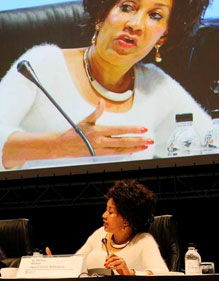
Sisulu was speaking to journalists on the first day of the Human Settlements Indaba in Johannesburg on Thursday. The event ran until Friday afternoon.
“It is completely unacceptable, that R2-billion could have been used to produce more houses.”
Going forward, said Sisulu, contractors who are found to have built houses of a lesser standard than that required by the department, will have to answer to the National Home Builders Registration Council (NHBRC).
“…the NHBRC has to ensure that anybody who builds shoddy houses is brought back to fix those houses. We will no longer use taxpayers’ money to fix work that has been shoddily done.”
Stepping up delivery of houses
At the centre of the two-day event is the adoption of government’s second social contract, a policy framework within which the rollout of housing projects will be carried out. Sisulu stressed the department’s keenness to work with stakeholders in different areas of the housing market, indicating that through the Indaba her department was aiming to ensure that everyone involved in the building or funding of housing projects was on the same page.
“We realised that unless we have a total mobilisation of the banking sector, the private sector, the NGOs and other stakeholders, we would not achieve what we had set ourselves to achieve,” said Sisulu in her address to the over 1 000 delegates. “We successfully mobilised the stakeholders that helped us deliver six mega projects that helped us refine our policies and exceed our goals.”
One of these goals is the centralisation of the beneficiary database, for years a headache for the department. Sisulu noted the plan to import existing lists of potential beneficiaries – which currently sit with municipalities across the country – onto one system that is trackable.
“The people who apply for housing are at local government level, and are captured in a central database at national level,” said the minister. “We have been putting the municipalities under enormous strain. They do not have the capacity to capture the beneficiaries on their lists. When anything goes wrong, the first thing our people think is ‘we’re dealing with a corrupt official’, when sometimes they just do not have the lists that we require.”
When the lists are centralised, municipalities will be able to access the database.
The department hopes to use a database managed by the home affairs department, which has the official population register of the country. This will then be matched against the database held by the department of social development, to determine who is deserving of assistance in housing provision.
Priority groups for the department, explained Sisulu, are the elderly, military veterans and child-headed households.
Communities urged to get involved in building houses
An opportunity exists for younger members of the population to meet the government halfway and build their own houses on state-issued land, said Jockin Arputham, president of Slum Dwellers International.
According to Arputham, state dependency drops significantly when communities take on part of the undertaking of building shelter for their families.
Sisulu agreed with this, expressing that her department will be introducing a programme that will address this market, of which she hopes young people will make up a large part.
In Friday the Indaba featured the signing of a pledge between the department and private sector stakeholders.

